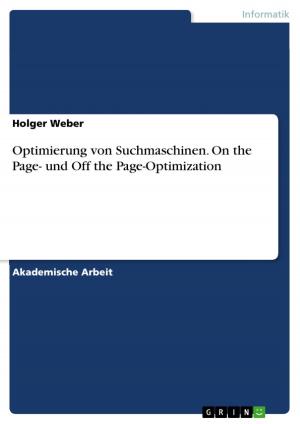Bargaining in Israel - How to bargain in Israel as an exchange student
Business & Finance, Marketing & Sales| Author: | Daniel Müller | ISBN: | 9783656020028 |
| Publisher: | GRIN Verlag | Publication: | October 4, 2011 |
| Imprint: | GRIN Verlag | Language: | English |
| Author: | Daniel Müller |
| ISBN: | 9783656020028 |
| Publisher: | GRIN Verlag |
| Publication: | October 4, 2011 |
| Imprint: | GRIN Verlag |
| Language: | English |
Seminar paper from the year 2010 in the subject Business economics - Marketing, Corporate Communication, CRM, Market Research, Social Media, grade: 2,0, University of Haifa (-), language: English, abstract: How to haggle in the Middle East? Which strategy is best to prevail against local stratagems as a student or tourist? The paper copes with these questions and combines bargaining theory with practical experience from Israel. It can be used as a manual for students, tourists and travelers in the Middle East. A) Israeli Culture of Market Bargaining Haggling is considered an art in the Middle East. The unique approach of time and business relations is an unforgettable experience. Beside the idiosyncratic atmosphere in Jerusalem's bazaar(1), almost all shops in Israel, including grocery's stores, offer the opportunity to bargain about prices. The Western rationale of 'Time is money!' is in the Middle Eastern setting less valid than in Europe or America. Israeli sellers in return, easily perceive that their potential trading partner is in a rush and try to exploit this drawback by only presenting goods of a higher price class. Taxi drivers tend to exploit passengers, who are apparently unwilling to bargain a better price or simply leave and take another taxi, too. On the other hand, long term trading relationships are held in high esteem.(2) It might pay, to build lasting relationships with the vendors in the local shouq, i.e. Hebrew for market. Even if it is merely about goods of a low value, such as groceries, nuts or spices, established trust facilitates transactions to both parties' benefit.(3) [...] _____ 1 See Friedman, p. 1. 2 See Kuhri, p. 699
Seminar paper from the year 2010 in the subject Business economics - Marketing, Corporate Communication, CRM, Market Research, Social Media, grade: 2,0, University of Haifa (-), language: English, abstract: How to haggle in the Middle East? Which strategy is best to prevail against local stratagems as a student or tourist? The paper copes with these questions and combines bargaining theory with practical experience from Israel. It can be used as a manual for students, tourists and travelers in the Middle East. A) Israeli Culture of Market Bargaining Haggling is considered an art in the Middle East. The unique approach of time and business relations is an unforgettable experience. Beside the idiosyncratic atmosphere in Jerusalem's bazaar(1), almost all shops in Israel, including grocery's stores, offer the opportunity to bargain about prices. The Western rationale of 'Time is money!' is in the Middle Eastern setting less valid than in Europe or America. Israeli sellers in return, easily perceive that their potential trading partner is in a rush and try to exploit this drawback by only presenting goods of a higher price class. Taxi drivers tend to exploit passengers, who are apparently unwilling to bargain a better price or simply leave and take another taxi, too. On the other hand, long term trading relationships are held in high esteem.(2) It might pay, to build lasting relationships with the vendors in the local shouq, i.e. Hebrew for market. Even if it is merely about goods of a low value, such as groceries, nuts or spices, established trust facilitates transactions to both parties' benefit.(3) [...] _____ 1 See Friedman, p. 1. 2 See Kuhri, p. 699















